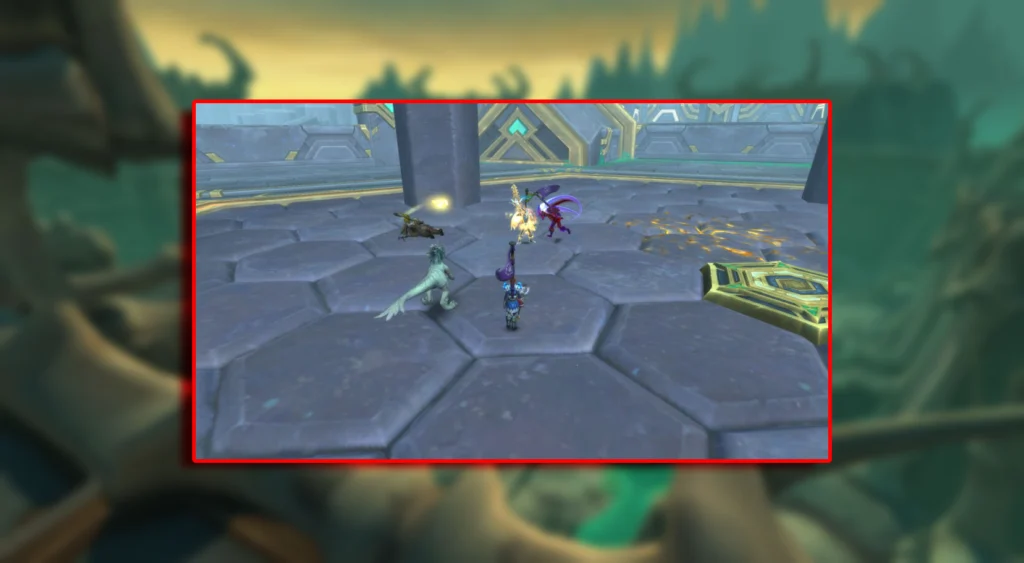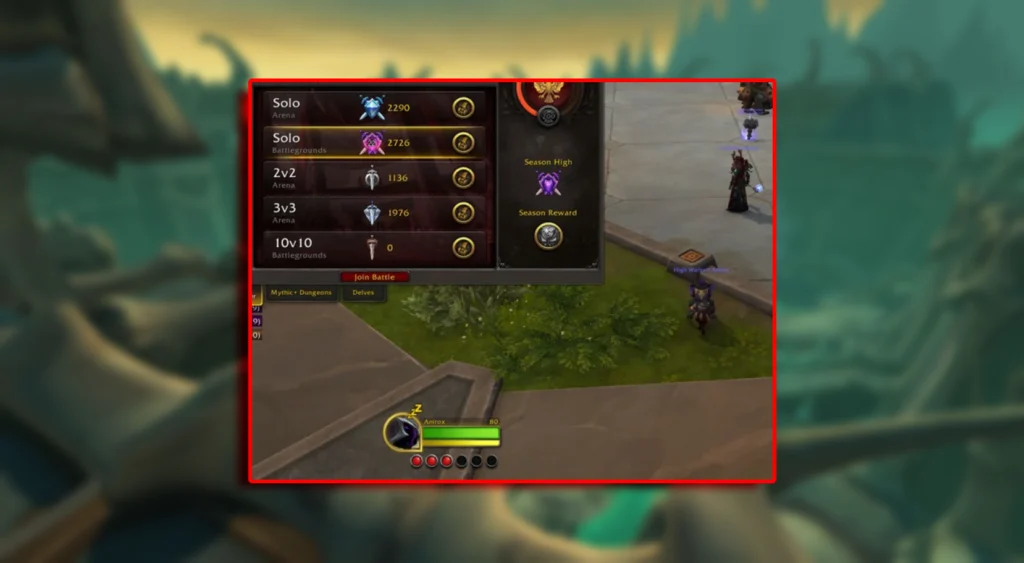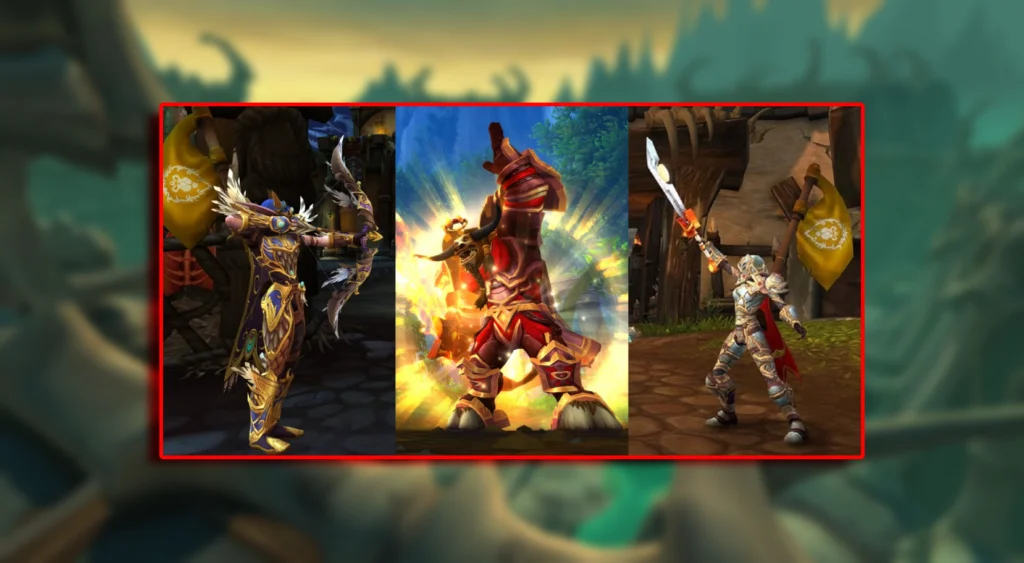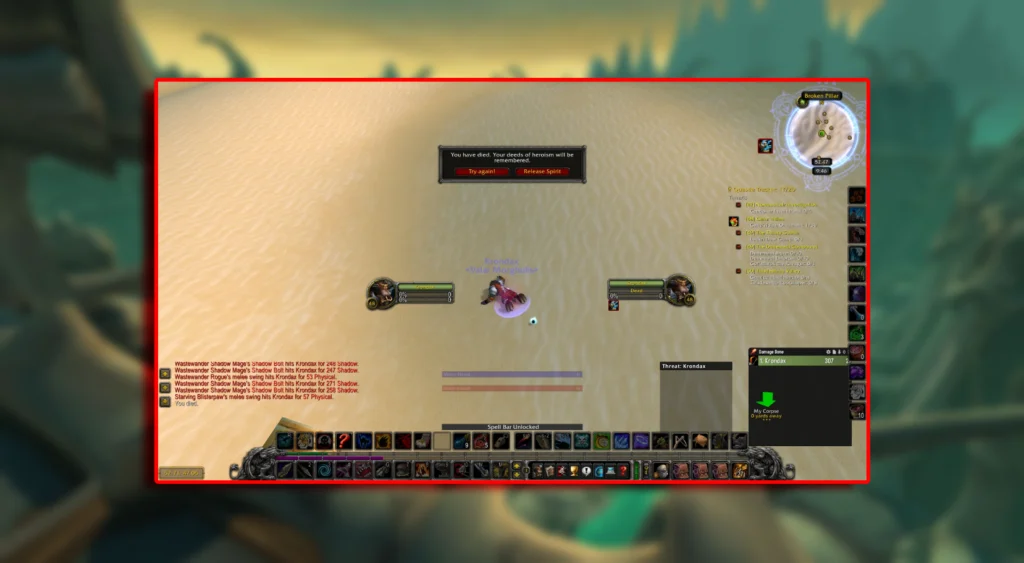
With World of Warcraft entering its TWW (The War Within) expansion, PvP Arena has experienced another major shake-up. New talents, reworked abilities, and an overall shift in the meta have many players excited—and a bit overwhelmed. If you’re looking to get better at WoW Arena in 2025, now is the time to double down on learning and adapt to these changes.
Why TWW Arena Matters
- Fresh Talent Trees: Classes like Warriors, Mages, and Priests have fresh branches of talents that can drastically alter gameplay.
- Evolving Meta: Each major patch introduces new “best comps,” forcing players to constantly update their strategies.
- Community Buzz: Over on Reddit (r/worldofpvp), you’ll see daily discussions about how TWW fosters either the most balanced or the most chaotic meta in recent years (depending on who you ask).
Key Point: Embracing this environment of constant change is crucial. The best Arena players thrive under uncertain conditions—they adapt faster than everyone else. Don’t forget to check our recent guide – How to Improve at WoW Arena – 10 Tips from Gladiators if you wanna know some more!
Master Your Class and Specialization: Foundation of All Great PvPers
Deep Understanding of Mechanics
The first step to improving in WoW Arena is knowing your own toolkit inside and out. This goes beyond reading the spell tooltip—it means internalizing how spells chain together, when to use them, and how they interact with other classes’ abilities.
- Tip: Spend time on target dummies in Valdrakken or major cities to practice your damage rotations and get used to weaving in utility spells.
- Practice in BGs: Random battlegrounds give a more relaxed environment to test new combos before taking them into the high-stakes environment of Arena.
Quick Self-Check
- Rotation: Can you deliver burst damage or healing seamlessly without fumbling on the keyboard?
- Defensives: Do you have muscle-memory mastery over your major cooldowns (e.g., Cloak of Shadows, Divine Shield) so you can pop them at the right moment, not a second too late or early?
- Utility: How often are you using your interrupts, dispels, or crowd-control spells?
Specialization Nuances
Many classes have multiple PvP-viable specs in TWW—e.g., a Priest might choose between Discipline or Shadow. Each spec has distinct strengths:
- Shadow Priest: High DoT pressure, mid-range control, synergy with casters.
- Discipline Priest: Hybrid of healing and damage absorption, thrives in comps needing survivability.
Pro Tip: If your chosen spec is consistently bottom-tier in every tier list or major tournament showing, consider learning a secondary spec. You don’t have to abandon your main class, but being flexible can greatly speed up your Arena climb. Get your 3v3 arena carry and avoid all of those low-skilled pugs with Us! We always happy to help!
Know Your Enemy: Understanding Opposing Classes

Knowing your own class is half the battle—understanding what the other nine classes (and their specs) can do is the other half.
| Class | Key Danger | Weak Point |
|---|---|---|
| Rogue | Stun locks, high burst (especially Subtlety) | Squishy if caught out of stealth or no evasion |
| Mage | Polymorph, massive burst with Icy Veins or Combustion | Vulnerable to stuns, limited defensives without shields |
| Warrior | Consistent damage, strong gap-closers | Kited by highly mobile classes, reliant on healer synergy |
| Death Knight | Death Grip, strong melee pressure, DoTs in Unholy spec | Struggles vs. high mobility or repeated CC |
Research Tip: Browse r/worldofpvp or specialized Discord channels to read player-submitted guides on “How to counter X class.” The community often shares nuanced tips, like which moment to use a defensive vs. an Assassination Rogue’s vendetta burst.
Adaptability Through Knowledge
If you know how a Demon Hunter typically sets up kills—like using The Hunt plus a quick stun—you can prepare a defensive counter (e.g., using a minor cooldown right as you see them cast The Hunt). Over time, these micro-interactions become second nature.
Example: A Restoration Shaman anticipating a Sub Rogue’s opener might preemptively Earth Shield themselves and position near a pillar to avoid being Sapped. This disrupts the Rogue’s perfect opener and can shift momentum.
Building the Perfect Team: Communication, Synergy, and Role Clarity

Arena is rarely a solo endeavor—especially in 3v3, the bracket that awards Gladiator. So, forging a strong team is critical.
Clear Roles
- Shot Caller: Usually the DPS or Healer with the best arena awareness. They announce kill targets, CC rotations, and cooldown usage.
- Utility Specialist: Another member might track enemy cooldowns or DR timers.
- Backup Caller: If the main shot caller is caught in CC or tunnel-visioning, a secondary voice can take over.
Pro Tip: Decide roles before you queue. Many teams lose purely because no one called out a kill target or trinket usage in time.
Effective Communication
Short and sweet is the name of the game. Long, rambling explanations mid-match cause confusion. Instead, use quick callouts:
- “Swapping Priest now—he has no trinket!”
- “I’m CC’d—peel for me!”
- “Defensive in 3…2…1…popping aura mastery!”
Personal Anecdote: A 2.4k-rated Monk once said on Reddit, “We jumped 200 rating in a weekend by simply switching from text chat to voice chat. The synergy soared because we reacted to calls half a second faster.”
Essential Addons, Macros, and UI Setup
Must-Have Addons
| Addon | Purpose |
|---|---|
| Gladius | Enhanced arena frames: trinket status, DR timers, spec detection |
| WeakAuras | Customizable alerts for buffs, debuffs, cooldown tracking |
| OmniBar | Shows enemy offensive/defensive cooldown usage, letting you anticipate bursts |
Setting Up: Place these add-ons near the center or corner of your screen where you can glance easily without losing track of your character.
Macros
Focus Macros
#showtooltip Polymorph
/cast [@focus] Polymorph
- Ideal for quick CC on your focus target without switching from your main damage target.
Arena 1-2-3 Macros
/cast [@arena1] Hammer of Justice
/cast [@arena2] Hammer of Justice
/cast [@arena3] Hammer of Justice
- Allows you to stun a specific arena target instantly, crucial for fast setups.
Defensive Macros
#showtooltip Pain Suppression
/cast [@mouseover,help,nodead][@target,help,nodead][@player] Pain Suppression
- With one button, you can quickly shield yourself or an ally (using mouseover or target).
Tip: Simplify your macros so they’re easy to remember. Overly complex macros can cause confusion in the heat of battle.
UI Recommendations
- Minimalism: Hide unnecessary bars, chat boxes, or distracting visuals.
- Centered Unit Frames: Keep your team and enemy frames near your field of vision.
- Focus on DR Timers: Understanding when you can safely re-stun or re-CC can be the difference between a kill and a wasted global cooldown.
Advanced Strategies: Cooldown Trading, Target Swaps, and LOS Mastery
Let’s dive deeper into the nuts and bolts of high-level Arena gameplay.
Cooldown Trading
Definition: Trading your major defensives or trinkets in response to an enemy’s burst attempts.
| Mistake | Better Approach |
|---|---|
| Popping both your defensive and your healer’s big cooldown at once. | Time them separately for layering. If the enemy bursts again, you’ll have a second answer. |
| Using trinket on the first stun without analyzing the enemy’s kill window. | Wait to see if it’s a real kill attempt. Sometimes the first stun is a bait. |
Tip: If you notice on your OmniBar that the enemy’s major cooldowns (e.g., Avenging Wrath, Shadow Dance) are down, you can afford to save your defensive for the next wave.
Target Swaps
Don’t fall into the trap of tunneling a single target. Smart swaps can force extra defensives or catch an enemy off-guard.
- Identify Overlaps: If the healer used a major cooldown on one teammate, that might make a different teammate vulnerable.
- Watch for Trinket: If the enemy Mage just used trinket, they’re prime to be swapped on for a stun + burst combo.
Pro Insight: Some top Reddit threads mention that quick target swaps are especially deadly in TWW, as certain new talents are long cooldowns. If you force them early, swapping can find a moment when they’re unprotected.
LOS Mastery
Line of sight (LOS) is your friend—especially if you’re a healer or a squishy DPS.
- Healer: Hide behind pillars when you see the enemy caster winding up a big spell. This forces them to either move (losing time) or swap targets.
- Melee: Drag your kill target behind a pillar, away from their healer’s direct line. This sometimes results in them overextending.
Arena Example: In Nagrand Arena, you can run behind the central pillars to break line of sight on an opposing Mage. Force them to come to you, giving your melee time to jump on them.
Digging Deeper: Psychological Resilience and the Mindset of Winners

Handling Losses
Arena is stressful. You’ll face losing streaks. The difference between a 1.8k player and a 2.4k player often comes down to how they handle tilt.
- Loss Review: After each match, ask, “What went wrong? Did we overlap defensives? Did we mis-time CC?”
- Short Breaks: If you lose three in a row, take a 5-minute break. Tilt leads to rushed decisions.
Setting Small Goals
Rather than fixating on 2400 rating:
- Aim for +100 rating from your current baseline.
- Celebrate small achievements (like perfecting a macro, outplaying a tricky comp, or hitting a personal best).
- Reassess your weaknesses after each milestone.
Positive Team Environment
No one likes playing with a toxic partner. If your group devolves into blame and negativity, your synergy collapses.
- Uplifting Callouts: “We got this!” or “Nice peel!” fosters confidence.
- Constructive Criticism: Focus on the action, not the person. “We overlapped two major CDs—let’s stagger them next time,” is better than, “You messed up again.”
Reddit Meme: “Arena is 50% skill, 50% synergy, 100% can be ruined by a toxic meltdown.” – /u/SaltyButTrue
Practical Examples and Reddit Insights
Let’s illustrate a typical scenario:
Scenario: You (Frost Mage) + a Holy Paladin partner face a Sub Rogue + Discipline Priest comp in 2v2.
- Common Mistakes:
- You pop all offensive cooldowns while the Rogue is behind a pillar. Wasted time.
- Paladin uses bubble first stun, ignoring the fact that the enemy is holding major DPS cooldowns for a bigger go.
Improved Play:
- Pre-Game Strategy: You decide to force the Disc Priest’s trinket first with a well-timed CC chain, then swap to the Rogue next go.
- During the Match: Paladin calls out, “Rogue used Shadow Dance; I’m using minor defensive. Save your trinket for the next stun.”
- Reddit Advice: A top comment on r/worldofpvp suggests counting the Rogue’s GCD after they vanish. If they reappear with a cheap shot, be ready to blink or freeze them.
Result: By carefully coordinating, you outlast the enemy’s big goes. The Rogue eventually overextends chasing you around a pillar, Priest can’t heal him in time, and you secure the kill.
Sample Comps, Tier Lists, and TWW Arena Trends
Even if you’re not aiming for top-tier eSports competition, it helps to see how TWW’s meta is shaping up. Here’s a quick tier list based on community feedback and mid-season results:
| Spec | Tier | Notes |
|---|---|---|
| Arms Warrior | S | Powerful burst, easy synergy with many healers. |
| Frost Mage | A | Great control, strong burst combos with certain specs. |
| Subtlety Rogue | A | Deadly openers, best for CC setups but squishy if locked down. |
| Assassination Rogue | B | Solid damage but overshadowed by Subtlety in quick-burst metas. |
| Beast Mastery Hunter | B | Consistent pressure, mobile, but often struggles vs. heavy CC. |
| Shadow Priest | S | Insane multi-DoT pressure, utility with Life Grip, strong synergy. |
| Retribution Paladin | C | Hard-hitting but susceptible to kiting, heavily reliant on partner synergy. |
Healer Tier:
- Restoration Shaman (S) – Great utility, Purge, strong healing throughput.
- Holy Paladin (A) – Solid defensives, good synergy with melee cleaves.
- Discipline Priest (B) – Strong offensives but can be outhealed if pressured.
TWW Trend: The biggest shift from previous expansions is an emphasis on synergy-based comps—like pairing a control-based DPS (Frost Mage) with a burst-capable partner (Sub Rogue). Over on the official forums, players note that consistent crowd control plus well-timed burst is dominating mid to high ratings. We also offering 2v2 arena carry for ppl who don’t have team mates. Feel free to ask us and we’ll help you out!
Extra Tips: Continuous Learning, VOD Reviews, and Coaching
Continuous Learning
- Stay Updated: Each patch or hotfix might buff or nerf crucial abilities. A single 5% buff can catapult a spec from B-tier to A-tier.
- Reddit & Discord: /r/worldofpvp, class-specific Discord servers like “Warrior’s Den” or “LightsOut Paladin” are goldmines for advanced tips.
VOD Reviews
Recording your matches (via OBS or built-in recording software) can be a game-changer. Rewatch key moments:
- Where did you overlap cooldowns?
- Did you fail to peel for your healer at a critical time?
- Could you have swapped targets for a quick kill?
Pro Player Advice: Many high-level streamers claim that analyzing your own replays is as important as practicing. It’s uncomfortable but extremely rewarding.
Coaching or Mentorship
Paid Coaching: Sites like Overgear (or others you trust) often have pro players offering sessions to evaluate your gameplay.
Mentorship: If you’re in a supportive guild, see if a higher-rated player can watch a few of your matches and provide feedback. Sometimes, a single pointer from a Gladiator-level friend can fix a huge flaw in your game.
Remember: Even “self-play boosting” can be educational if you communicate with the booster—though focusing on actual skill-building is safer than purely buying rating.
Frequently Asked Questions
Q1: Can I reach Gladiator if I only play casually (a few hours a week)?
- Answer: Possibly, but it’s harder. Consistency is key. If you can’t queue regularly, your synergy with partners might suffer. Aim for short, focused sessions.
Q2: Should I reroll to a top-tier spec if mine is considered “weak”?
- Answer: If your goal is purely to climb rating, yes, meta specs help. But skill and synergy matter more than raw tier listings. If you love your spec, you can still push high if you play exceptionally well.
Q3: What if my friends want to play a less optimal comp?
- Answer: Coordination can still carry you far. Some “off-meta” comps surprise everyone if you have synergy. Just manage your expectations if the comp is drastically outclassed.
Q4: How do I handle toxic teammates?
- Answer: Either address the behavior calmly (“I’d appreciate it if we keep blame out of the conversation and focus on solutions”) or find new partners. It’s a game, and negativity kills motivation.
Final Thoughts:
Improving in WoW Arena—especially during the fast-paced TWW expansion—requires a blend of mechanical skill, strategic awareness, team synergy, and emotional resilience. Whether you’re aiming for your first taste of 2,000 rating or pushing for that prestigious Gladiator mount, the principles remain the same:
- Master Your Class: Know your spells intimately, refine your rotation, and practice intensively.
- Study Opponents: Recognize kill windows, anticipate bursts, and exploit weaknesses.
- Communicate and Coordinate: Crisp callouts and synergy can turn an average comp into a lethal one.
- Refine Tactics: Use add-ons, macros, VOD reviews, and consistent practice to sharpen your gameplay.
- Embrace Growth: Wins are fun, but losses teach you the most. Keep a positive mindset, adapt to changes, and keep chasing improvement.
Final Encouragement
PvP can be a rollercoaster, but there’s no thrill quite like outplaying a top-tier comp at the last second. The path from novice to Gladiator is filled with heartbreak, triumph, and a ton of learning. Stick with it, absorb every resource (forums, guides, Discord chats), and remember: every match is a step closer to your goals. Good luck out there in The War Within—the Arena awaits your ascension!
“The difference between 1800 and 2400 rating isn’t just skill—it’s dedication, perseverance, and a willingness to learn from every mistake. Keep going, champion!” – A wise Arena veteran.



